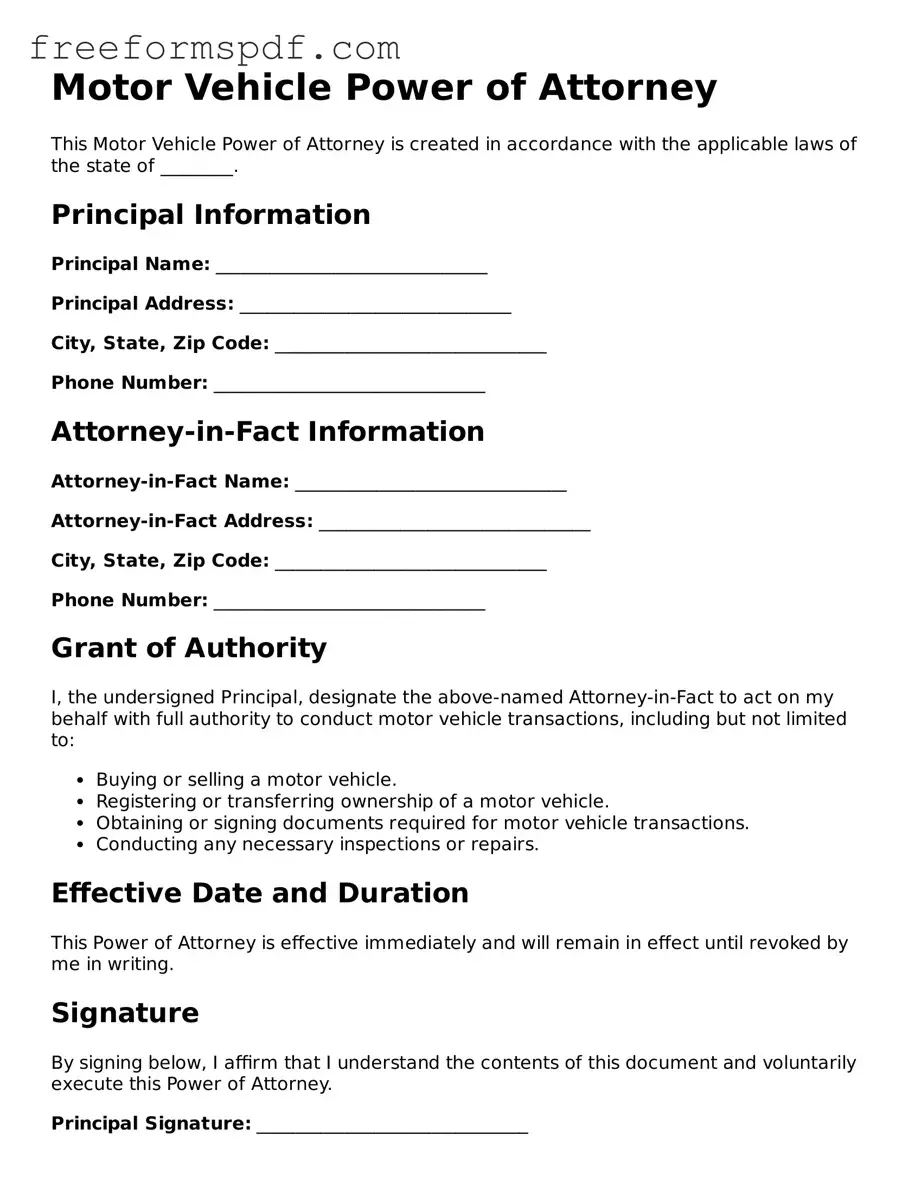Motor Vehicle Power of Attorney Document
Motor Vehicle Power of Attorney - Customized for Each State
Common mistakes
-
Not specifying the powers granted: Many individuals fail to clearly outline the specific powers they are granting to the agent. This can lead to confusion and potential misuse of authority.
-
Forgetting to include the vehicle details: Omitting important information about the vehicle, such as the make, model, year, and VIN, can render the document ineffective. The agent needs precise details to act on behalf of the principal.
-
Neglecting to sign and date the form: A common oversight is forgetting to sign or date the Power of Attorney form. Without a signature, the document lacks validity and may not be recognized by authorities.
-
Not having a witness or notary present: In some states, a witness or notary is required for the Power of Attorney to be legally binding. Failing to meet these requirements can invalidate the document.
-
Using outdated forms: Laws and requirements can change. Utilizing an outdated version of the Power of Attorney form may lead to complications, as it might not comply with current regulations.
-
Failing to communicate with the agent: It is crucial to discuss the responsibilities and expectations with the appointed agent. Lack of communication can result in misunderstandings and ineffective representation.
Learn More on This Form
-
What is a Motor Vehicle Power of Attorney?
A Motor Vehicle Power of Attorney (POA) is a legal document that allows one person (the principal) to appoint another person (the agent) to act on their behalf regarding motor vehicle transactions. This can include buying, selling, registering, or transferring ownership of a vehicle.
-
When should I use a Motor Vehicle Power of Attorney?
You may need a Motor Vehicle POA when you cannot be present to handle vehicle-related matters. This could be due to being out of state, having health issues, or simply being unable to attend a transaction in person. The POA ensures that someone you trust can manage these tasks for you.
-
Who can be designated as an agent in the Motor Vehicle Power of Attorney?
The agent can be anyone you trust, such as a family member, friend, or legal representative. It is important to choose someone responsible, as they will have the authority to make decisions regarding your vehicle on your behalf.
-
What powers does the Motor Vehicle Power of Attorney grant to the agent?
The agent typically has the authority to perform various tasks, including:
- Signing documents related to the sale or transfer of a vehicle
- Registering a vehicle with the Department of Motor Vehicles (DMV)
- Obtaining a duplicate title
- Completing any necessary paperwork for vehicle transactions
-
Is a Motor Vehicle Power of Attorney revocable?
Yes, a Motor Vehicle POA can be revoked at any time by the principal, as long as they are mentally competent. To revoke the POA, the principal should provide written notice to the agent and any relevant parties, such as the DMV.
-
Does a Motor Vehicle Power of Attorney need to be notarized?
In most cases, a Motor Vehicle POA does need to be notarized to be valid. Notarization helps verify the identity of the principal and ensures that the document was signed willingly. Check your state’s specific requirements, as they may vary.
-
How long is a Motor Vehicle Power of Attorney valid?
The validity of a Motor Vehicle POA can depend on state laws and the specific terms outlined in the document. Generally, it remains valid until revoked by the principal or until a specified expiration date, if included.
Misconceptions
Understanding the Motor Vehicle Power of Attorney form is crucial for anyone looking to manage vehicle transactions efficiently. However, several misconceptions can lead to confusion. Here are six common misunderstandings:
-
It can only be used for buying or selling vehicles.
Many people believe this form is limited to transactions like buying or selling a car. In reality, it can also authorize someone to handle registration, title transfers, and even obtaining duplicate titles.
-
It must be notarized to be valid.
While notarization can add an extra layer of authenticity, it is not a strict requirement for the Motor Vehicle Power of Attorney form to be valid in many states. Always check local regulations for specific requirements.
-
Only the vehicle owner can fill out the form.
This is not entirely true. While the vehicle owner must authorize someone to act on their behalf, the authorized person can assist in completing the form, ensuring it is filled out correctly.
-
It is only valid for a short time.
Some people think that the Motor Vehicle Power of Attorney is only effective for a limited period. In fact, it remains valid until the owner revokes it or until the specified tasks are completed, unless otherwise stated in the document.
-
It can be used for any type of vehicle.
This form is specifically designed for motor vehicles, which typically include cars, trucks, and motorcycles. It may not be applicable for other types of vehicles, such as boats or trailers, unless specified.
-
It is the same as a general Power of Attorney.
While both forms allow someone to act on behalf of another, a Motor Vehicle Power of Attorney is tailored specifically for vehicle-related matters. A general Power of Attorney covers a broader range of financial and legal decisions.
By clarifying these misconceptions, individuals can make informed decisions about using the Motor Vehicle Power of Attorney form effectively.
Other Types of Motor Vehicle Power of Attorney Forms:
Power of Attorney Revocation Form - Recommended when moving to a new state or facing life changes.
Understanding the nuances of a robust Lease Agreement is crucial for both landlords and tenants. For those interested in the specifics of rental arrangements, a thorough examination of the Arizona Lease Agreement can provide valuable insights and clarity on legal obligations.
